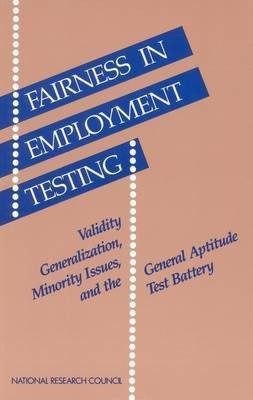Fairness in Employment Testing(English, Paperback, National Research Council)
Quick Overview
Product Price Comparison
Declining American competitiveness in world economic markets has renewed interest in employment testing as a way of putting the right workers in the right jobs. A new study of the U.S. Department of Labor's General Aptitude Test Battery (GATB) Referral System sheds light on key questions for America's employers: How well does the GATB predict job success? Are there scientific justifications for adjusting minority test scores? Will increased use of the GATB result in substantial increases in productivity? Fairness in Employment Testing evaluates both the validity generalization techniques used to justify the use of the GATB across the spectrum of U.S. jobs and the policy of adjusting test scores to promote equal opportunity.Table of Contents Front Matter Summary 1 The Policy Context 2 Issues in Equity and Law 3 The Public Employment Service 4 The GATB: Its Character and Psychometric Properties 5 Problematic Features of the GATB: Test Administration, Speedness, and Coachability 6 The Theory of Validity Generalization 7 Validity Generalization Applied to the GATB 8 GATB Validities 9 Differential Validity and Differential Prediction 10 The VG-GATB Program: Concept, Promotion, and Implementation 11 In Whose Interest: Potential Effects of the VG-GATB Referral System 12 Evaluation of Economic Claims 13 Recommendations for Referral and Score Reporting 14 Central Recommendations References Appendix A: A Synthesis of Research on Some Psychometric Properties of the GATB Appendix B: Tables Summarizing GATB Reliabilities Appendix C: Biographical Sketches, Committee Members and Staff Index


